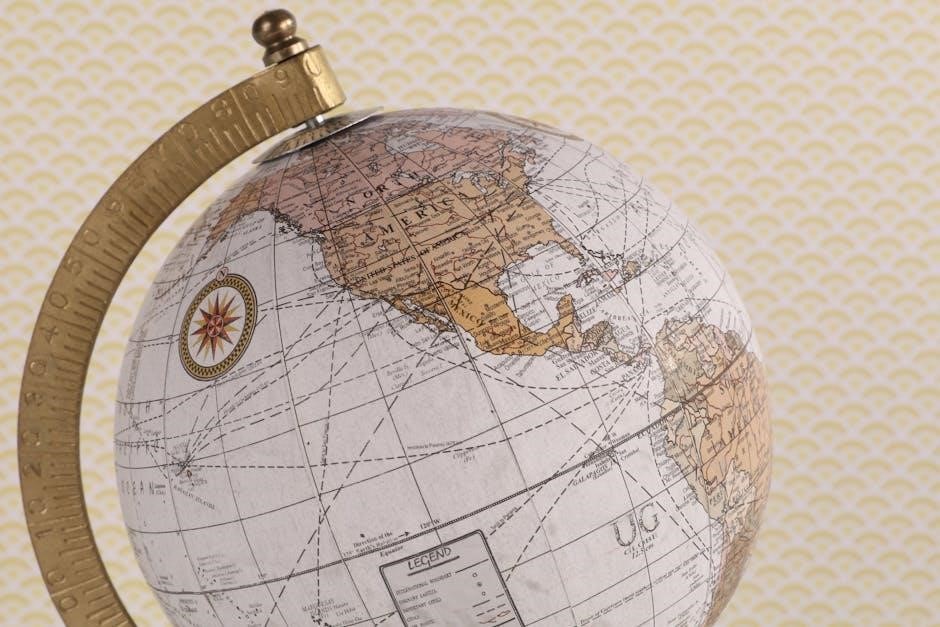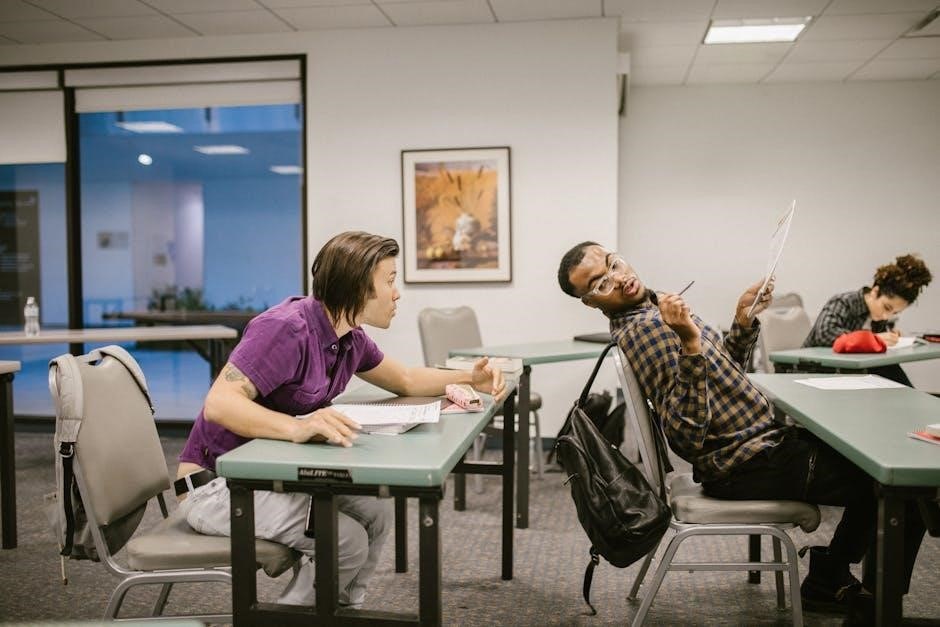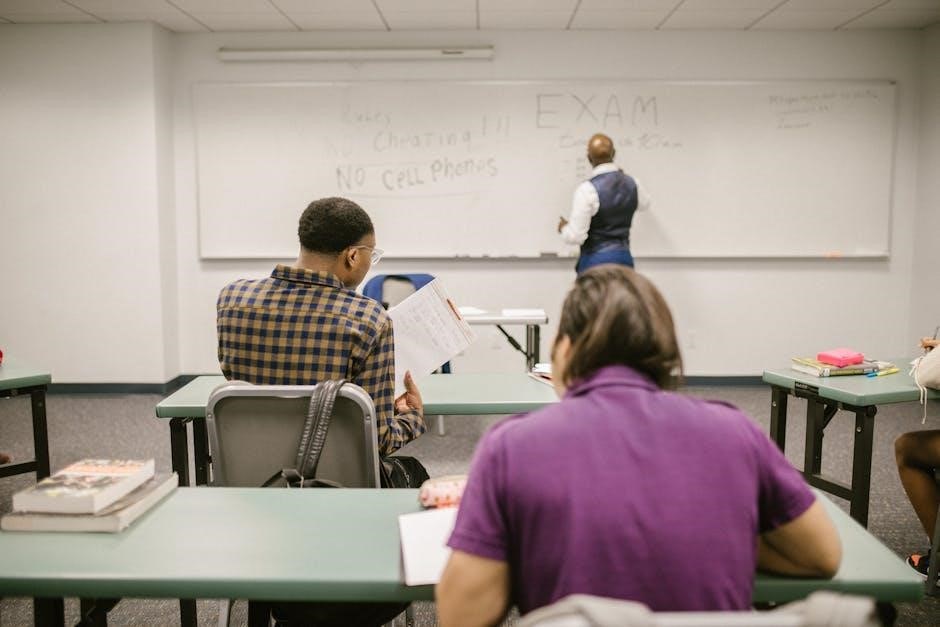This comprehensive study guide provides detailed answers and insights into key events‚ figures‚ and concepts in world history‚ aiding students in exam preparation effectively.
Purpose and Scope of the Study Guide
This study guide is designed to prepare students for the World History final exam by covering essential topics and themes. It provides detailed explanations‚ key events‚ and concepts‚ ensuring a thorough understanding of the subject. The guide includes answers to multiple-choice questions‚ short-answer prompts‚ and essay-style queries‚ reflecting the exam’s structure. Its scope spans from ancient civilizations to modern global issues‚ offering a holistic review of world history. This resource is invaluable for structured study‚ helping students identify and focus on critical areas for success.
Key Topics and Themes Covered
This study guide encompasses a wide range of historical periods and themes‚ from ancient civilizations to modern global issues. It covers the rise of Mesopotamia‚ Egypt‚ China‚ and the philosophical foundations of these cultures. Key themes include the impacts of feudalism‚ religion‚ and the Renaissance‚ as well as the Age of Exploration and its global consequences. The guide also addresses revolutions‚ industrialization‚ World Wars‚ and the Cold War‚ providing insights into cultural‚ political‚ and social developments that shaped the world. Prepare for a comprehensive review of major historical events and their significance.

Ancient Civilizations
Ancient civilizations‚ such as Mesopotamia‚ Egypt‚ China‚ Greece‚ and Rome‚ laid the foundation for modern societies through their advancements in governance‚ culture‚ and philosophy‚ shaping global history profoundly.
Mesopotamia and Egypt: Early Developments
Mesopotamia‚ often called the “cradle of civilization‚” saw the rise of city-states like Babylon and Ur‚ with advancements in writing (cuneiform)‚ agriculture‚ and governance. The wheel‚ invented here‚ revolutionized transportation and trade. In contrast‚ ancient Egypt‚ unified under pharaohs‚ developed hieroglyphs and monumental architecture like the pyramids. Both civilizations relied on river systems (Tigris-Euphrates and Nile) for agriculture‚ fostering early societies. Their contributions in law‚ religion‚ and culture laid the groundwork for future civilizations‚ showcasing human ingenuity and adaptability in diverse environments.
The Rise of China and Its Philosophical Foundations
The Zhou Dynasty introduced the Mandate of Heaven‚ legitimizing rulers and emphasizing moral governance. Confucianism‚ founded by Confucius‚ stressed ethics‚ social harmony‚ and education‚ shaping China’s cultural identity. Taoism‚ led by Laozi‚ promoted balance with nature and minimal government intervention. Legalism‚ championed by Han Feizi‚ advocated strict laws and centralized authority. These philosophies influenced China’s political and social systems‚ laying the groundwork for its imperial future and enduring cultural legacy‚ blending moral principles with practical governance strategies that resonated across generations.
Ancient Greece and Rome: Contributions to Western Civilization
Ancient Greece laid the foundation for Western philosophy‚ democracy‚ and the arts. Socrates‚ Plato‚ and Aristotle pioneered rational thought‚ while Greek theater and mythology enriched cultural expression. Rome adapted Greek ideas‚ developing a sophisticated legal system‚ architectural innovations like the Colosseum‚ and a vast empire governed by the Republic. Roman law‚ Latin language‚ and governance structures profoundly influenced modern societies‚ bridging ancient wisdom with enduring legacies that continue to shape Western civilization’s intellectual and cultural landscape.

Medieval Period
The medieval period saw the rise of feudalism‚ shaping Europe’s social hierarchy and economy‚ while religion dominated culture‚ influencing art‚ politics‚ and daily life profoundly.
Feudalism in Europe and Its Impact on Society
Feudalism emerged as a social and economic system in medieval Europe‚ structuring society into a hierarchical framework. Lords owned land‚ granting portions to vassals in exchange for loyalty and military service. This created a pyramid of obligations‚ with peasants at the base‚ working the land and providing resources. The manorial system dominated rural life‚ fostering local self-sufficiency. Feudalism shaped Europe’s political and social structures‚ limiting social mobility while providing stability in turbulent times. Its decline began with the Black Death and the rise of a money-based economy‚ gradually eroding the feudal order.
The Role of Religion in Shaping Medieval Culture
Religion‚ particularly Christianity‚ dominated medieval culture‚ influencing every aspect of life. The Catholic Church was the central authority‚ shaping moral values‚ education‚ and art. Religious institutions preserved classical knowledge and promoted literacy. Cathedrals and illuminated manuscripts showcased artistic achievements inspired by faith. The Church also governed societal norms‚ with concepts of sin‚ salvation‚ and divine authority guiding daily life. Religious conflicts‚ such as the Crusades and the Inquisition‚ further highlighted its profound impact on medieval society‚ creating a culture deeply intertwined with spiritual beliefs and practices.

Early Modern Period
The Early Modern Period (16th-18th centuries) saw transformative cultural and global changes‚ marked by the Renaissance’s revival of learning and the Age of Exploration’s expansion of empires.
The Renaissance and Its Cultural Significance
The Renaissance (14th-17th centuries) was a cultural and intellectual movement that revitalized art‚ science‚ and philosophy‚ marking the transition from the medieval to the modern world. It emerged in Italy‚ spreading across Europe‚ and was characterized by humanism‚ which emphasized human potential and individualism. Figures like Leonardo da Vinci‚ Michelangelo‚ and Galileo made groundbreaking contributions‚ while advancements in printing and education disseminated knowledge widely. This period laid the foundation for modern thought and innovation‚ ending the Middle Ages and shaping the Early Modern Period.
The Age of Exploration and Its Global Consequences
The Age of Exploration (15th-17th centuries) was driven by European nations seeking new trade routes‚ wealth‚ and territories. Portugal and Spain led the way‚ with explorers like Columbus‚ Vasco da Gama‚ and Magellan mapping new lands. This era reshaped global politics‚ economies‚ and cultures. The Columbian Exchange transferred plants‚ animals‚ and diseases between hemispheres‚ while colonization exploited indigenous peoples and resources. The period marked the rise of European dominance and laid the groundwork for modern globalization and cultural exchange.

Revolution and Industrialization
This section explores the transformative impact of revolutions and industrialization on societies‚ highlighting political‚ social‚ and economic changes that reshaped the world.
The French Revolution and Its Legacy
The French Revolution‚ beginning in 1789‚ was fueled by Enlightenment ideas‚ financial crisis‚ and social inequality. Key events include the Storming of the Bastille‚ the Reign of Terror‚ and the execution of Louis XVI. The Revolution’s legacy includes the rise of Napoleon‚ the spread of revolutionary ideals across Europe‚ and the establishment of modern political ideologies. Its impact on democracy‚ human rights‚ and national identity remains significant in world history.
The Industrial Revolution: Economic and Social Transformations
The Industrial Revolution‚ beginning in Britain in the late 18th century‚ transformed economies from agrarian to industrialized systems. Key innovations included the steam engine‚ mechanized textile production‚ and the expansion of factories. This period saw significant economic growth‚ urbanization‚ and the rise of a middle class. Socially‚ it led to harsh working conditions for the working class and the emergence of labor movements. The revolution reshaped global trade and laid the foundation for modern industrial society‚ creating lasting impacts on economic structures and social dynamics worldwide.

World Wars and Their Impact
World Wars I and II were pivotal events in shaping global history. Key aspects include causes‚ major battles‚ and the Holocaust‚ profoundly impacting societies and international relations.
Causes and Key Events of World War I
The assassination of Archduke Franz Ferdinand in 1914 triggered World War I‚ but underlying causes included the complex system of alliances‚ militarism‚ imperialism‚ and nationalism. Key events like the Battle of the Marne‚ trench warfare‚ and the introduction of new technologies reshaped combat. The United States entered after Germany resumed unrestricted submarine warfare and sank the Lusitania. The Treaty of Versailles ended the war‚ imposing harsh penalties on Germany‚ which later contributed to World War II.
World War II: Major Battles and the Holocaust
World War II saw pivotal battles like Stalingrad‚ Midway‚ and Normandy‚ which shifted the war’s momentum. The Holocaust‚ orchestrated by the Nazis‚ targeted Jews‚ resulting in six million deaths. Key camps such as Auschwitz carried out mass exterminations under the Final Solution. The war concluded with the liberation of camps‚ revealing atrocities and shaping global human rights efforts.

Cold War and Modern Era
The Cold War defined global tensions between the U.S. and USSR‚ marked by proxy wars and the arms race. Its end ushered in globalization and modern challenges.
The Cold War: Tensions and Proxy Conflicts
The Cold War was a decades-long ideological and geopolitical rivalry between the U.S. and USSR‚ marked by proxy wars‚ espionage‚ and the arms race. Key conflicts included the Korean and Vietnam Wars‚ while events like the Cuban Missile Crisis brought the world to the brink of nuclear war. The Berlin Wall symbolized the division of Europe‚ and proxy wars in Afghanistan and Nicaragua highlighted Cold War tensions. The era ended with the Soviet Union’s collapse‚ reshaping global politics and alliances.
Globalization and Contemporary Issues in World History
Globalization has interconnected the world economically‚ culturally‚ and technologically‚ fostering interdependence among nations. Contemporary issues such as climate change‚ pandemics‚ and political polarization highlight the challenges of modernity. The rise of multinational corporations and digital communication has reshaped global dynamics‚ while issues like inequality and migration continue to impact societies worldwide. Understanding these trends is crucial for grasping the complexities of the 21st century and addressing future global challenges effectively.
